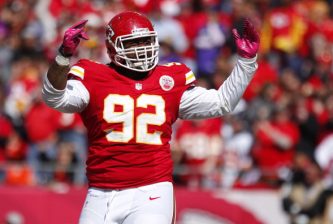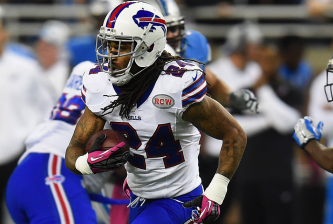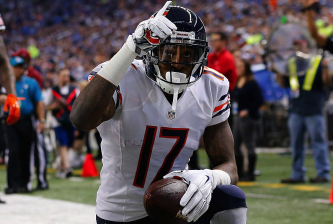This year on This weekend in NFL stupid, we’re focusing on one extremely stupid winner with an honorable mention or two on a weekly basis. To close out an especially stupid Week 9 of the 2015 regular season, we look back on one of the worst game-management decisions of the year.
The winner: Atlanta Falcons head coach Dan Quinn
A bevy of abysmal game-management decisions were made on Sunday, but none were worse than the one Quinn made with his team trailing by four points late against the San Francisco 49ers.
Matt Ryan had just completed a third-down pass to Justin Hardy, which left the Falcons on the San Francisco 1-yard line and about three and a half minutes to play. And that’s when Quinn, knowing he had two timeouts and the two-minute warning on his side, decided to send out the field-goal unit.
Matt Bryant’s 19-yard kick made it a one-point game, but Quinn was gambling hard that his defense would get the ball back by stopping the 49ers on the first set of downs on the ensuing possession and that his offense would then drive back into field-goal territory before making another kick.
Indeed, statistically, he hurt his team’s chances significantly by not gambling on a fourth down that had better than a 50/50 chance of succeeding.
Going for it would have given Atlanta a 48.6 percent win probability. A field goal attempt would have given them a 27 percent win probability. The decision cut the Falcons’ chance of winning nearly in half. Those estimates account for the relative strength of teams, as the Football Power Index gave the Falcons a 76 percent chance of winning at the outset of the game.
Keep in mind that a fourth-down gamble there also doesn’t lose the game. None of this is black and white, and had the 49ers stuffed Atlanta at the goal line, the Falcons would have had at least the same chance at making a stop as they did after kicking off. Plus, the 49ers would have been handcuffed that deep, and Atlanta presumably would have had much better field position after said stop.
Sure enough, Atlanta’s defense wasn’t able to create a three-and-out after the kickoff and the Falcons never possessed the ball again, losing by a point and causing fans to wonder what would have been had their rookie head coach not gone against odds and logic.
First runner-up: Tennessee Titans interim head coach Mike Mularkey
The Titans were still lucky enough to win on Sunday, but that doesn’t make Mularkey’s conservative and stupid late-game strategy any less conservative and stupid.
See, Tennessee got to the New Orleans 32-yard line with 2:42 remaining in a tie game, and Mularkey — apparently under the impression that being in “field-goal range” is a guaranteed three points — decided to pack it in with three consecutive runs, including one on 3rd-and-16.
That forced poor kicker Ryan Succop to attempt the go-ahead field goal from 55 yards, and sure enough he hit the cross bar.
Had Mularkey’s special-teams unit not bailed him out with a clutch blocked field goal on the ensuing Saints possession, that overly-conservative approach to being in “field-goal range” would have cost Tennessee the game.
Second runner-up: St. Louis Rams head coach Jeff Fisher
Fisher committed the same mistake as Mularkey late Sunday against the Minnesota Vikings, running with Todd Gurley on a 3rd-and-10 from the Minnesota 34-yard line with less than two minutes to play in a game the Rams trailed by three.
Running to set up 50ish-yard field goals is dumb and cowardly, which is why it was fitting that kicker Greg Zuerlein missed the ensuing 48-yard attempt.
The Rams would get the ball back and kick a field goal to force overtime, but had they played their cards better in that initial situation, St. Louis might have won in regulation instead of losing in OT.
Third runner-up: Jacksonville Jaguars head coach Gus Bradley
You’re down 28-23 with one timeout left and your opponent has the ball with a first down near midfield. The Jets run for three yards, leaving 2:12 on the clock. Logically, now is the time to use your final timeout. But no, Bradley decides to let 12 seconds run off the clock before the two-minute warning, instead using his last timeout after the second-down play.
Why? I dunno. Seriously, how can anyone rationalize letting 12 seconds go?
The Jags stopped the Jets on the next two downs and got the ball back with 54 seconds left. But had Bradley used his timeout on the other side of the two-minute warning, they would have had an extra dozen seconds. That’s the type of thing that can separate a loss from a win.




